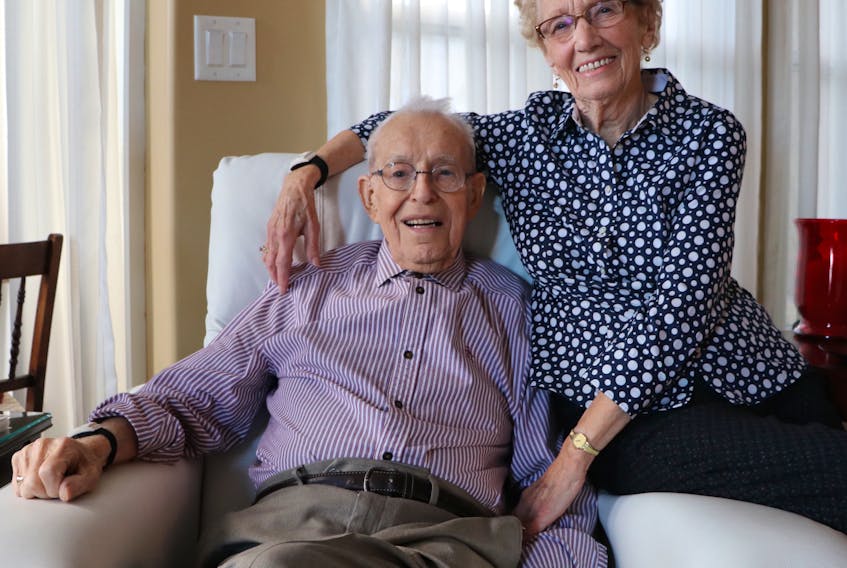ST. JOHN'S, N.L. - Frank Pike, 89, has found a sense of closure to a painful part of his past thanks to the thoughtfulness of a stranger and her family on the other side of the Atlantic.
Earlier this month, in the days leading up to Remembrance Day, Pike was thinking once again about his oldest brother, Walter Kitchener Pike — a gunner with the Royal Artillery, 59 (Newfoundland) Heavy Regiment in the Second World War — who died in a motorcycle accident in England on Oct. 1, 1941. Walter, who was 26 years old, had been granted a medical discharge and was awaiting transport back home to Newfoundland when the accident occurred.
His family in St. John’s was planning a welcome home celebration, when Walter’s wife received notification that Walter had died.

Frank, who was 12 at the time, was devastated. He said he had looked up to Walter more as a father figure than as a brother and was looking forward to his return home.
Over the years he has always felt that emptiness and sense of loss, particularly with his older brother being buried so far away.
“It was pretty bad. I was young,” Frank said earlier this week. “Every Armistice Day I have it in the church bulletin. I have thought about him a lot, his being over there alone.”
On Nov. 8, Frank celebrated his 89th birthday.
In The Telegram the next day, he saw a story that contained a photo of two women in the United Kingdom standing by his brother’s gravesite at Bybrook cemetery in Ashford, Kent. In the photo, the women — Judith Holloway and her daughter, Alice — are preparing to place a small, wooden cross with a poppy attached at the gravesite in honour of Walter Pike.
Frank says he could hardly believe what he was seeing and reading in the paper. He had always wanted to go visit his brother’s grave, but wasn’t able to, but to see that Walter’s grave was being looked in on by kind people helped fill the emptiness he felt, he said.
“I was shocked. I really was,” he said. “I was just getting over my birthday, and the next day to have this is really a miracle as far as I’m concerned.
“What (Judith) has done … I have had wonderful feelings about this. She must be a kind woman. When I read that (Judith) was visiting his grave, I said, ‘Well, that’s as good as me being over there.’”
Holloway, who lives just outside of Ashford, Kent, has said that on one of her visits to her father’s gravesite in that same cemetery she noticed Pike’s grave marker — the only Newfoundlander buried there, apparently.
Since then, Holloway — who knew little about Newfoundland and Labrador at first — and her daughter pay tribute to Walter Pike when they visit the cemetery, not just because he fought to help protect them, but because he is “so far away from home.”
Frank’s wife, Rhoda Pike, said it was a very emotional day for her husband when he read the article. He’s the only surviving sibling out of eight children. He is the youngest and Walter was the oldest boy. With their father working away at sea for long periods of time, Walter became something of a father figure to Frank.
“Nobody knows how much this means to Frank,” Rhoda said. “What (Judith) and her family in the United Kingdom have done has given him closure.”
The 59th (Newfoundland) Heavy Regiment formed in 1940 to first provide coastal defence in the United Kingdom from incoming German Luftwaffe and any naval threat.
According to the Heritage Newfoundland and Labrador website, when war broke out in September 1939, Newfoundland and Labrador lacked any form of ground force to send overseas. Although it had raised, equipped and maintained the Royal Newfoundland Regiment during the First World War, the country’s economy had deteriorated to the point where it could not afford a similar undertaking during the Second World War.
“Instead, Britain's Royal Artillery (RA) recruited and trained some 2,343 volunteers from Newfoundland and Labrador at its own expense,” the website states. “These men formed two battalions – the 57th and 59th (Newfoundland) Heavy Regiments. The former fought in North Africa and Italy, while the latter defended Britain’s coasts for three years before fighting in France, Belgium, the Netherlands and Germany.”
Vicki Colbourne, Frank’s daughter, along with her children, visited Walter Pike’s grave on behalf of her father about 15 years ago during a trip to Europe.
Colbourne said she carried small amount of Newfoundland soil and a small beach rock to place on Walter’s grave.

“He did not actually die during action in the war. He was medically discharged and was to be sent back to Newfoundland,” Colbourne said. “His family was preparing a welcome home party for him and the night before he was due home, he was killed in a traffic accident while returning a motorcycle to the garage for his supervisor.”
Frank remembers being in his family’s St. John’s backyard 77 years ago, playing with a friend, when someone told him Walter was coming home. He can’t remember the time he was told Walter had died and would not be coming home.
The letter Walter’s wife, Gladys, received from Recruiting Headquarters, dated Oct. 3, 1941, states merely that Walter had been killed Oct. 1, 1941 as a result of a motor accident. There was no further information.
Frank said he still remembers a lot about his brother.
“Walter was a kind person. He’d do anything for anybody. And he used to play tricks on me,” Frank said. “He worked as a machinist with the railway, and payday was on a Saturday and he’d come home and put some money on the hot stove and I was supposed to get them off.
“One Christmas, the present he had for me, he stored (hid) it in by the piano and I found it and played with it for about an hour until I heard the door open, and I rushed to put it back where I found it. It was a battery-operated tractor,” Frank said. “He was good to me.”
Frank said the family later received more information about Walter’s accident. A dispatch rider, who had been riding all night, came into town.
“Walter said to him, ‘You go report to your commanding officer and I’ll take your motorcycle to the barn,’” Frank said. “And so he took the motorcycle and came down to an intersection in the road, and whatever happened — maybe his foot slipped — and he was struck by a lorry.”

The reason Frank suggests Walter’s foot might have slipped is that in a work accident before he joined the war, Walter had lost two toes on one foot. He also lost an index finger.
“I couldn’t understand how he was accepted,” Frank said.
Another of Frank’s brothers, Jack, also served overseas during the Second World War, with the Royal Air Force.
Walter did not die immediately in the accident, and Jack was able to get to him before he died from his injuries.
That gives Frank some comfort, as well, that Walter hopefully knew his brother was there.
“Jack was the only one to see him alive after the accident,” Frank said.
Rhoda Pike said Jack stayed to attend Walter’s funeral.
“Jack had said that a very kind elderly lady there, a stranger, came across some flowers and brought them to Walter’s funeral,” Rhoda said. “That lady knew there were no other family members there. The kindness of Judith now reminds me of the kindness that lady had shown.”
These days Frank is unable to get out much. At his home, he has taken up a hobby of building beautiful scale models of world landmarks, such as the Eiffel Tower and London Bridge, with matchsticks. It’s a hobby that helps to keep his mind occupied, a mind filled with memories of all his siblings, his parents and the brother who took care of him so well when he was a boy.
The fact that Walter was buried so far away, that there was no funeral for Frank to attend, was difficult. But now, knowing that Judith and her family are looking in on Walter has given him a sense of closure after all these years.
RELATED









